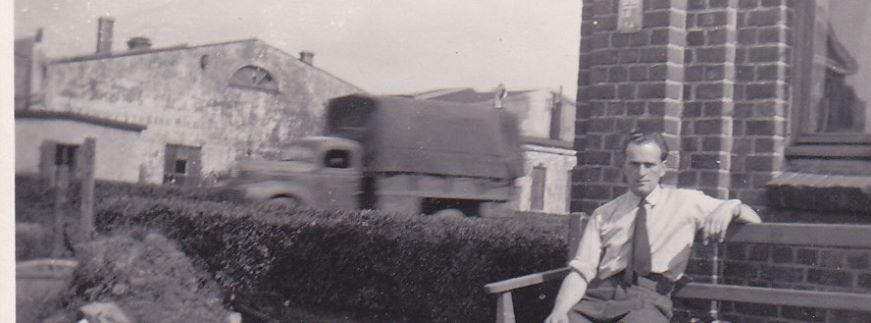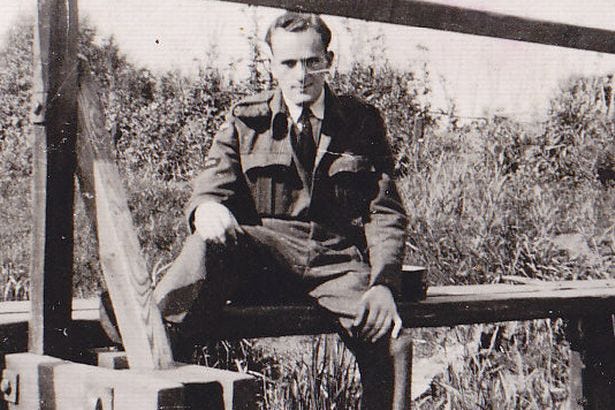From the struggles of the Greatest Generation, the modern Welfare State was born only to be destroyed by neoliberalism over the last three decades. To forget that past is to live in a purgatory of centrist politics that only benefits the few.
Below is an excerpt from the Green & Pleasant Land about how the end of the Second World War felt to my father, an ordinary working man, who lived through extraordinary times. As a bonus there is a two minute audio file of Harry Leslie Smith remembering the end of that war.
The Green & Pleasant Land, the project my Dad was working on at the time of his death is almost ready. Your tips and subscriptions keep me going and Harry’s Last Stand’s legacy alive.
It was before dawn on May 1st when my unit left Den Haag for Germany. We were destined for Hamburg, and our mission was to occupy its Luftwaffe airbase in the city’s northern suburb of Fuhlsbüttle.
Hitler had killed himself in his Berlin bunker the day before, but no one in my unit knew that when we began our journey. So there was trepidation that where my unit was going would be as bloody as the Battle of Berlin. On the road to Hamburg, there was a continuous sound of nearby artillery explosions. The sky above us was crowded with USAF and RAF fighter planes protecting our advance.
An officer warned us to expect resistance once we entered Germany- from Wehrmacht army units and German civilian partisans. Instead, when we crossed the border, I saw a nation in total collapse and on the run from the war.
The shoulders of the dual carriageways were clogged with an endless sea of refugees. The migrants fleeing the war were a mixture of forced labourers and the diaspora, from Germany’s eastern provinces.
Most of them were emaciated, filthy and looked near death. When we camped for the night, my unit set up a field kitchen to feed any refugees who happened to stumble into our vicinity. But as our goal was Hamburg, we didn't do as much as we should have.
The following morning, we resumed our push towards Hamburg. Everything smelt at the beginning of that May in 1945 of fresh earth, flowers and death because the corpses of soldiers and civilians lay unburied everywhere you looked.
Sometimes famished dogs made a meal of the dead discarded on the shoulder of the road. If we saw it happen, someone discharged a rifle shot to either kill or scare off the animals.
On the fifth of May, our convoy briefly halted to stretch our legs and to let us know the news that Hamburg was an open city. Field Marshal General Montgomery accepted the surrender of all German armies, navy, air, and anything that could, would, or should carry a gun in the northern part of Germany in a tent at Luneburg Heath from a clean-shaven General Admiral Hans-Georg von Friedeburg, the last supreme commander of the Krieg’s Marine.
The surrender was for Holland and northwest Germany, including Denmark. The rest of the Third Reich still resisted despite the surrender of Berlin, Vienna and now Hamburg. But for me and my unit, there would be no fighting- our way into Hamburg.
It was afternoon when my unit reached the outskirts of Hamburg. Woodbine cigarettes and Capstans dangled from our mouths. The straps to our tin helmets hung loosely around our chins. As we drove through the city, brick dust billowed against my uniform.
Hamburg was a modern-day Carthage. The grey faces of the ‘master race' scurried around like rodents upon our approach, or that is how I thought of them because of what their soldiers had done to Holland's civilian population.
On that day, I had no feelings for Germans except relief that the killing was over. I was twenty-two in May 1945 and was now sure I'd see twenty-three. I had a cigarette hanging between my lips, and my stomach was full. I had survived, while so many had not.
On May 5th 1945, in a foreign and defeated country, I began a new odyssey. From the rubble of war a better destiny than my past was granted to me and my working class kind because we created a Welfare State to remember our dead from war and the cruelty of the Great Depression.
Your subscriptions are so important to my personal survival because like so many others who struggle to keep afloat, my survival is a precarious daily undertaking. The fight to keep going was made worse- thanks to getting cancer along with lung disease and other co-morbidities which makes life more difficult to combat in these cost-of-living crisis times. So you can join with a paid subscription, which is just 3.50 a month or a yearly subscription or a gift subscription or just help out with a tip. I promise the content is good, relevant and thoughtful. But if you can’t it's all good too because I appreciate we are in the same boat.




